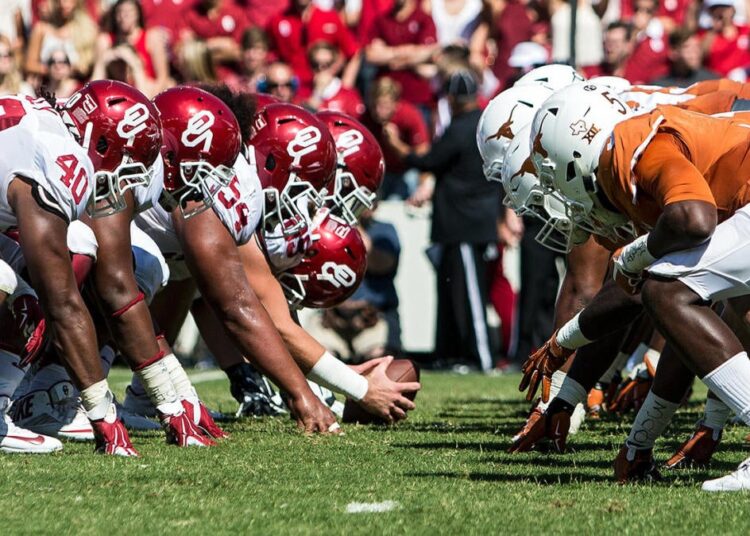Should an early exit by Texas and Oklahoma from the Big 12 be agreed upon, the negotiated financial penalties associated with those departures would be utilized to aid the conference’s expansion. Those monies would help make whole the eight legacy Big 12 programs whose media rights payouts are being diluted to help fund the arrival of the league’s four newest members.
Baylor, Iowa State, Kansas, Kansas State, Oklahoma State, TCU, Texas Tech and West Virginia agreed to share a portion of their media rights distributions from the Big 12’s existing deals with Fox and ESPN to make possible the league’s recent expansion with BYU, Cincinnati, Houston and UCF joining the fold in the 2023-24 athletic season. The vote (believed to be held last year) was 8-0 in favor of the move with Texas and Oklahoma abstaining, multiple sources tell CBS Sports.
Each of the eight legacy Big 12 schools agreed to forego $16 million total ($8 million annually in 2023-24 and 2024-25), approximately 19% of their $42.6 million annual distributions, sources said. Each of the four new Big 12 members are set to receive $18 million to $19 million annually, approximately 40% of the original annual distribution.
BYU, Cincinnati, Houston and UCF will each receive a full share of media rights revenue when the Big 12 begins its new deals in the fall of 2025, a source added. That full share will be a base figure of $31.6 million annually. Big 12 officials believe the all-in figure will approach $50 million per school once NCAA Tournament and College Football Playoff revenue is added.
If Texas and Oklahoma leave after the 2023-24 season, they would be on the hook for early termination fees with each surrendering at least their final year of media rights distribution. CBS Sports previously reported those early exit fees could total as much as $168 million.
However, such a penalty would likely be negotiated down to about 60% to 65% of the original total, industry sources said. That final figure would go a long way to helping the remaining legacy Big 12 programs recoup the $16 million dilutions they agreed upon.
“That money [for the four new schools] has to come from some place so the other members have to take a dilution as a result of it,” former Big 12 commissioner Bob Bowlsby told CBS Sports. “That’s the only place to go get the money, but in the end, whatever the conference gets out of OU and Texas in exit fees and makes on the grant of rights will likely go to reimburse the schools. It likely will balance itself out pretty well.”
While there has been growing buzz that a deal for Texas and Oklahoma to depart for the SEC early is near, there is no evidence of formal negotiations.
The programs retained SEC media advisor Alan Gold in their pursuit of a deal. The Longhorns and Sooners originally committed to the Big 12 through the term of the current deal when new commissioner Brett Yormark took over in August; however, their stances changed about a month later, sources said.
Speculation has raged that Texas and Oklahoma have no desire to play the four new Big 12 members, though they have already committed to remain in the league for the upcoming season. The conference is in the process of finalizing a schedule for all 14 programs.
The legacy Big 12 programs shared money from their current distributions knowing Fox and ESPN likely wouldn’t pay equal value for the four new members. Those schools didn’t bring pro rata (equal) value to the existing deal. League sources said the conference did not ask its partners for increased rights fees.
In 2016, the Big 12 considered exercising a clause in an old contract that would have compelled rightsholders to pay equal value for any expansion. The Big 12 ultimately decided not to expand at that time.
For there to be any new agreement on an early exit, Fox would have to be compensated for the loss of Texas and Oklahoma from its existing deal. (ESPN would retain Texas and Oklahoma rights as part of its SEC deal.) CBS Sports reported last month that compensation could come in the form of the Longhorns and Sooners playing nonconference games in Big 12 stadiums after they join the SEC.
Such an agreement was called using “games as currency.”
“They would have to play games in the [Big 12] footprint so Fox and ESPN can have value,” an industry source told CBS Sports. “If ESPN and Fox are happy, [the Big 12] would be happy.”
In October, the Big 12 announced a new deal with Fox and ESPN beginning in 2025 that is worth more than the current deal that includes Texas and Oklahoma. The aforementioned all-in figure of approximately $50 million would reflect a $7.5 million annual increase in rights fees per school..
Read the full article here

























